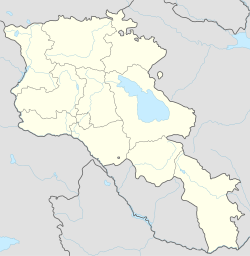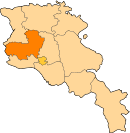Mastara
Mastara Մաստարա | |
|---|---|
 Street in the village of Mastara. | |
 Mastara Մաստարա | |
| Coordinates: 40°26′53″N 43°52′54″E / 40.44806°N 43.88167°ECoordinates: 40°26′53″N 43°52′54″E / 40.44806°N 43.88167°E | |
| Country | Armenia |
| Marz (Province) | Aragatsotn |
| Area | |
| • Total | 2.42 km2 (0.93 sq mi) |
| Elevation | 1,745 m (5,725 ft) |
| Population (2001) | |
| • Total | 2,571 |
| • Density | 1,100/km2 (2,800/sq mi) |
| Time zone | UTC+4 (GMT+4) |
| Postal code | 0511 |
Mastara (Armenian: Մաստարա) is a village in the Aragatsotn Province of Armenia. The 5th-century Armenian Church of S. Hovhannes is situated in the northeastern half of the village, while the church of S. Stepanos Nakhava sits on a hilltop to the north. There is also the small medieval Tukh Manuk Church in the village to the southeast.[1]
Etymology[]
The name Mastara is thought to be derived from the words mas, meaning "a piece", and tara, "I buried/took". This comes from the popular legend that Gregory the Illuminator brought back relics of John the Baptist from Caesaria, a fragment of which he enshrined beneath the Church of S. Hovhannes.[1]
Gallery[]

S. Hovhannes Church

S. Hovhannes Church

S. Stepanos Nakhavka Church
See also[]
References[]
Categories:
- Populated places in Aragatsotn Province
- Aragatsotn geography stubs




